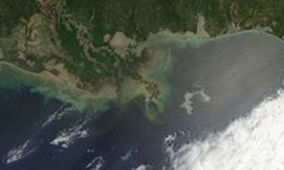Time to come clean with Cuba on oil spill
- Submitted by: admin
- Environment
- international
- 05 / 24 / 2010

The Deepwater Horizon oil disaster is about to raise some important new questions about the costs and limits of U.S. policy toward Cuba.
According to Brad Johnson, a climate researcher at the Center for American Progress, oil from the spill carried by the Loop Current is likely to reach the Florida Strait by tomorrow, posing a direct threat to Cuba's marine environment.
News agencies are reporting that U.S. diplomats in Havana informed the Cuban government just days ago of details on the Gulf of Mexico oil spill and where it is likely to move.
A State Department spokesman said, "It is incumbent upon us to inform all of our neighbors . . . those countries that could be affected by disasters that happen within our territorial waters."
The United States needs to come completely clean with Cuba - and with all of us - about the size, location, extent, and severity of the disastrous flow of oil and chemical dispersants into the Gulf of Mexico following the explosion at the Deepwater Horizon Rig that took place on April 20th and killed eleven workers.
We already know that figures released by BP concerning the volume of oil pouring into the Gulf since the accident woefully underestimate what most experts believe is actually occurring.
In addition to the millions of gallons of oil released, there is now more than 600,000 gallons of chemical dispersants in the Gulf being used to contain the spill.
The extent and boundaries of the oil plume beneath the surface of the Gulf are unknown. The toxic effect of the dispersants being used to control the spill is unknown.
The U.S. is expanding the closures of fisheries in our territory, but questions surrounding this decision are yet to be fully answered. Is the entire 20% contaminated? Should Cuba take a similar action? If so, why?
The U.S. should be communicating all of this to the Cuban government so it can make its own risk assessment and establish its own priorities for the policy actions it should consider taking to protect its people, its climate, its fisheries, and its tourism industry.
As Robert Muse and Jorge R. Piñon wrote recently in a Brookings Institution issue brief, there are international frameworks under which the two countries could and should cooperate to protect their shared interests.
However, there is a larger point at stake. We shouldn't have to be talking about how, or whether, or to what extent we should be cooperating with Cuba in the face of this crisis, just as we don't have to invent or improvise a relationship with Mexico to do so. But our policy of not talking to Cuba, not having diplomatic relations with Cuba, demanding concessions from Cuba
to engage with the U.S. cooperatively has precisely this kind of cost, and produces this kind of outcome.
So let the discussions confirmed by the State Department take place. Let's hope they're comprehensive and fruitful.
Let's hope the U.S. government discloses more information to the Cubans - and to all of us - about the dangers to which the Gulf has been exposed.
But let's also hope that the bigger lesson of this crisis is learned and acted upon; we don't have to like the Cuban system it from a normal relationship with the Cuban government, and we shouldn't allow ideology and domestic political concerns to block the orderly transfer of information about a disaster to a neighbor who shares with us stewardship of a gorgeous but now threatened eco-system.
By Sarah Stephens
Source. www.huffingtonpost.com/
Comments